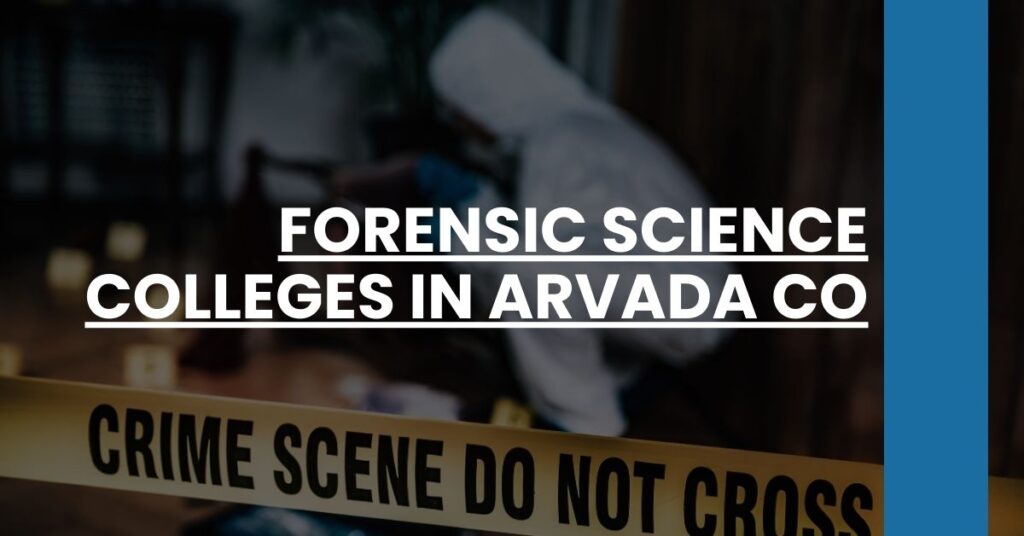Not in Arvada? Check out our lists of Forensic Science Colleges in Boulder, Centennial, Colorado Springs, Denver, Fort Collins, Greeley, Highlands Ranch, Lakewood, Longmont, and across Colorado.
Are you looking for the best forensic science colleges in Arvada, CO?
This article highlights top programs that stand out for their curriculum, hands-on experience, and industry connections.
Whether you’re drawn to forensic biology, crime scene investigation, or lab work, find out which Arvada college can pave your way to a fulfilling career in forensic science.
Warren Tech – Forensic Science Program
Find out why Warren Tech’s Forensic Science program stands out in Arvada, CO. The program is designed for those who aspire to enter the forensic science field with a solid and practical education.
Here are the highlights you should consider:
- Diverse Curriculum: The program covers physical evidence analysis, forensic pathology, forensic anthropology, and wildlife forensics.
- Hands-On Experience: Students practice laboratory management, safety protocols, organ dissection, and skeletal remains examination.
- Advanced Coursework: Enroll in Advanced Forensic Science, Forensic Chemistry, and Forensic Biology to deepen your learning.
- Qualified Instructors: The program is led by educators with extensive experience and advanced degrees in Biology, Secondary Science Education, and Linguistically Diverse Education.
- Career Preparation: Prepares students for further studies in specialized forensic science fields or general studies at bachelor’s and graduate levels.
- Weighted Credits: Earn transferable college credits in Biology through BIO 1004 and BIO 1005 courses.
Choosing Warren Tech ensures that you gain a rich blend of theoretical knowledge and practical skills, laying a strong foundation for your future career in forensic science.
Red Rocks Community College – Criminal Justice Program
Explore the Criminal Justice program at Red Rocks Community College (RRCC) in Arvada, CO. Designed with versatility and practicality in mind, this program offers various pathways to a career in law enforcement and related fields.
Key aspects include:
- Comprehensive Curriculum: Courses cover vital topics such as sex assault, domestic violence, juvenile delinquency, criminal profiling, crime scene investigation, victimology, and crisis intervention.
- Specialized Degrees: The AA in Victim Assistance can seamlessly transfer to degrees in social work, human services, or counseling psychology.
- Law Enforcement Training: The Basic Law Enforcement Training Academy (P.O.S.T. Certification) is an 18-week program essential for aspiring law enforcement officers.
- Career Readiness: The program prepares you for entry-level positions in police, sheriff departments, parole, probation, and victim assistance.
- Partnerships with Four-Year Schools: Programs like “gtPathways” guarantee that credits earned at RRCC can transfer to several four-year institutions.
- Practical Skills Emphasis: Curriculum design focuses on real-world applications and computer literacy essential for the criminal justice field.
An education at RRCC provides you with the skills and knowledge required to succeed in various career paths within the criminal justice field, making it a strong option for forensic science and law enforcement aspirants in Arvada.
Next, embark on a detailed exploration of what to consider when selecting the best forensic science program in Arvada, CO. Factors include accreditation, curriculum comprehensiveness, hands-on experience, faculty expertise, and post-graduate opportunities.
Choosing the Best Forensic Science Program in Arvada CO
When it comes to selecting the best forensic science college in Arvada, CO, it is essential to weigh several criteria. Understanding these factors can help ensure you make an informed choice that aligns perfectly with your career aspirations.
Accreditation
Accreditation is a non-negotiable element when choosing a forensic science program. It ensures that the institution meets established educational quality standards. Programs accredited by recognized agencies often have rigorous academic and practical components, making their graduates more attractive to employers.
Curriculum
A well-rounded curriculum is crucial. Ensure the program covers essential areas such as:
- Forensic Biology: Investigating biological materials at crime scenes.
- Forensic Chemistry: Chemical analysis of substances found at crime scenes.
- Trace Evidence Analysis: Examining small pieces of evidence like hair, fibers, and paint.
- Crime Scene Investigation: Techniques and protocols for gathering and analyzing crime scene evidence.
Advanced courses should also be available for those looking to specialize further.
Hands-On Experience
Real-world skills are developed through hands-on experience. Programs that offer:
- Laboratory Work: Extensive lab work to mirror professional forensic environments.
- Simulations: Realistic crime scene simulations to practice investigative techniques.
- Forensic Analysis Scenarios: Case study analyses to understand the application of forensic methods.
Faculty Expertise
Quality instruction comes from experienced educators. Faculty should have:
- Industry Experience: Work history in forensic science or law enforcement.
- Academic Qualifications: Advanced degrees in relevant fields.
- Current Practices: Active involvement in ongoing forensic science methodologies.
Post-Graduate Opportunities
Assess the program’s post-graduate pathways for job placement and further studies. Key aspects to consider include:
- Internship Opportunities: Real-world experience in forensic labs, law enforcement agencies, or other relevant organizations.
- Job Placement Support: Resources and assistance in securing employment after graduation.
- Alumni Networks: Connections with former students working in the field can provide mentoring and job opportunities.
Learning Environment
A conducive learning environment is critical. Factors to look for include:
- Class Size: Smaller classes for personalized instruction.
- Student-to-Teacher Ratios: Lower ratios ensure more interaction with instructors.
- Campus Visits: Tours and meetings with current students can provide insights into the program’s culture and dynamics.
By taking these elements into account, you can select a forensic science program that provides a solid foundation for your career.
Conclusion: Making the Final Decision
Choosing the right forensic science college in Arvada, CO is a significant step toward a rewarding career. Each college offers unique strengths, whether through specialized coursework, hands-on experience, or strong industry connections.
Carefully evaluate your options to find the program that best fits your academic and career goals. By investing time in researching and selecting the right college, you can ensure a bright future in the field of forensic science.

